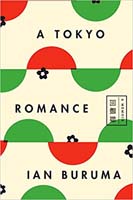By: DWIGHT GARNER
The Dutch-born historian and New York Review of Books editor Ian Buruma spent several years in Tokyo when he was in his early 20s, and he picked up a nickname. Because “Buruma” sounds a bit like the word “bloomers” in Japanese, at least one acquaintance — Hijikata Tatsumi, the father of Butoh dance — called him Underpants or, for short, Pants.
It was an affectionate sobriquet. The Japanese playwrights, dancers, film directors and actors who made up Buruma’s milieu in the mid-1970s adored him. He was exotic, a gaijin, as white as tofu. He was tall and good-looking and possessed a trace of bohemian glamour because it was known that his uncle was John Schlesinger, the director of “Midnight Cowboy.”
Buruma had come to Tokyo on scholarship to study film. He was in flight from a pampered Dutch childhood that he describes, in his fond and artful if sometimes remote new memoir, “A Tokyo Romance,” as “a world of garden sprinklers, club ties, bridge parties and the sound of tennis balls in summer.”
The Japanese art world put young Buruma to use. One Butoh troupe placed him onstage in a small scarlet jockstrap. While he struck a bodybuilder pose and the Tom Jones song “It’s Not Unusual” bellowed in the background, a modern ballet dancer writhed around him wearing only a “minuscule bikini bottom of sparkling silver.”
One hopes Buruma is persuaded to reprise his half of this performance at New York Review holiday parties. He’s a self-deprecating man, the butt of every joke he tells. At the end of this performance his only job was to catch the dancer in his arms. To stunned silence in the audience, he dropped her.
In another performance, Buruma stood onstage amid flying pork cutlets, a drag queen, a “dog god” and actors fighting over a placenta in a plastic bag. His role was to wear a leather cowboy hat and exclaim, on cue, “I am the Midnight Cowboy!”
Buruma also appeared in not one but two Suntory whiskey ads, as if presaging Bill Murray’s sarcastically avuncular role in “Lost in Translation.” In one of these ads he appeared alongside Akira Kurosawa, the director of “Rashomon” and “Seven Samurai.”
Buruma was, in other words, half male ingénue and half avant-garde Zelig during his Tokyo years. He was a bonhomous lurker. His memoir describes his intellectual and sexual coming-of-age.
He fell in with a group of Western gay men, including the film historian Donald Richie, who were sexual exiles, able to live more freely in Japan than in the United States or England.
They were Buruma’s charons into a raffish world of erotic cabarets and sex shows and carnival acts. The scenes flicker past as if lit by strobe lights: women urinating into plastic umbrellas held aloft by happy club patrons; sex in toilet stalls and in movie theaters; a girl who bites the heads off chickens; a man known as the Human Pump for his intricate regurgitation abilities.
“I cannot imagine wanting to immerse oneself in another culture,” Buruma writes, “without feeling a sensual pull.” His own sexuality was still up for grabs. He had a Japanese girlfriend when he first moved to Tokyo.
He dated other women, including nude dancers and a jazz singer “who belted out Peggy Lee numbers late at night for my benefit — why Peggy Lee, I don’t know.” In his pursuit of ravishment there were men as well.
Buruma casts an emollient eye over the multiple and overlapping ways that he felt like an outsider in Japan. He often received special treatment as a gaijin, but just as often it was made clear to him that he would never get as close to this culture as he wanted.
His own personality kept him between worlds. “Hovering on the fringes was where I liked to be, neither in nor out, neither one thing nor another, semidetached, a born fellow traveler, a male fag hag, an observer in the midst of sympathetic strangers.”
Buruma is a keen observer and the owner of a well-provisioned mind. There are smart little junkets in this book into everything from Japanese movies (Buruma became a film critic for The Japan Times) to the country’s tattooing culture to its female elevator operators, about whom he made a documentary film.
His prose is unflaggingly good. The experimental theater director Ritsaert ten Cate, for example, “had a face like an unmade bed: hooded eyes, loose cheeks, lips like two cuts of liver.”
Buruma worked as an assistant to Magnum photographers while in Tokyo, and took his own photographs as well, many of which are printed in this book. You sense him in this memoir, like a photographer working in a darkroom, burning his memories here and dodging them there.
There’s a good deal of dodging, one senses, in the area of his sexual experience, his desire to be both moth and flame. “A Tokyo Romance” is about Buruma’s desire to live life up to his nostrils, and clearly he has.
For a book that is largely about extreme experience, in terms of art and life, he is perhaps overly discreet about his own emotions and behavior. Whenever you sense he is about to open a door, he instead drops you at the curb.
It was P. G. Wodehouse, of all people, who asked, “What’s the use of a great city having temptations if fellows don’t yield to them?” Buruma did his share of yielding. He filed everything away.
When he returned again to live in the West, his time in Tokyo led to magazine work and his first book contract. “Japan,” he writes, “was the making of me.”



